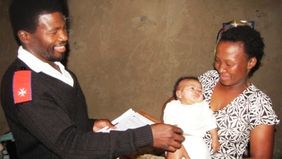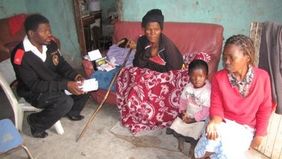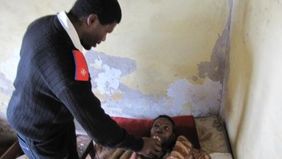AIDS patients are treated through the HAART programme, the use of highly effective antiretroviral drugs. By taking these drugs regularly, infected people can live up to 25 years longer in good health. For a mother, this means that she will once again be able to take care of her children and bring them up. There were people lying terminally ill in the hospice. Through the administration of medication and good care, they were soon able to be discharged. Day after day, two therapy counsellors, each in an all-terrain vehicle, are on the road in the slum and in the bush. They do aftercare for the AIDS patients. They monitor the intake of the antiretroviral drugs. The counsellors also teach the patients how to grow vegetables and raise small animals. In this way, the people become independent and can provide for themselves. One day I am on the road with one of the therapy counsellors. He has the medical and therapy files of the people to be visited with him. The appointments are made with the patients in advance so that they can be at home. During the conversation, he inquires about the state of health and asks, for example, an AIDS patient to have herself and her baby examined by the doctor again in the hospice.
The woman has given birth to a healthy baby girl. Precautions can be taken before and during birth so that the child is not infected with the HIV virus at birth. If the mother is diagnosed with the disease early, antiretroviral treatment can be started in time to reduce the viral load to a minimum. The risk of infection is considerably reduced by a caesarean section. Careful cleaning and disinfection of the birth canal can help, but is much less effective.
The so-called prevention of mother-to-child-transmission (PMTCT) involves the risk that the child will not be infected, but the mother can become resistant afterwards, so that a later antiretroviral treatment would remain ineffective. In this case, a single dose of antiretroviral drugs is administered at the beginning of labour.
Two days later I see the woman with her baby girl in the waiting room of the hospice and we wave happily to each other.
The drive continues through the bush.
The therapy advisor drives along paths that I would never have thought were passable. Again and again, a few huts appear as if out of nowhere. "How can you find your way around here in this vast confusing area?" Mr Zulu says, "I have a lot of experience by now. I've been doing this job for five years (this accomplished worker has been a volunteer since 1997 and full-time for the Brotherhood of Blessed Gérard since 2000)." And no matter how remote the place our patient comes from, he finds his way there. As we enter a house after a long gruelling journey, many chickens run out of the house, clucking loudly. "The grandmother, the daughter, the son and the little girl all have AIDS. All of them are being given the drugs." The treatment plan is discussed and the counsellor asks very carefully whether the medication is taken regularly by all family members. Irregular intake of the medication carries the risk of the virus becoming resistant to the medication.
The two therapy counsellors travel to the bush every day and visit up to 13 follow-up patients per day. Their tasks do not only include counselling and monitoring the intake of the medication. The men also help patients by showing them how to grow vegetables, salad and fruit. In the meantime, one patient has been able to set up his own small farm. He has implemented everything he was shown. He not only grows fruit and vegetables, he also raises chickens. With the help of the Brotherhood of Blessed Gérard, this patient was able to build up a livelihood. He proudly shows us around his small property. The work of the Brotherhood has literally borne fruit.
I am very happy when the man climbs his papaya tree to give me some of these tasty, juicy fruits. As we leave, he joyfully shakes our hands and waves at us for a long time. We visit four more patients that day. This work is extremely important, because without these medicines, these people would soon be so sick that they would not be able to get up from their beds and would face certain death. Later, the nursing team takes the ambulance to the last patient we visit that evening. She has mouth rot, which is a sign that her immune system has been weakened by her AIDS disease. From a certain stage of the disease, the sick have to fight many infections.
In the evening I ask my brother, Father Gerhard, how it could be that whole families are infected with the deadly virus. "You know, they get raped. Or when the men work far away and come home once a year, they make their wives happy with a new child and it is infected at birth. The woman usually doesn't even know she is HIV-positive yet, because the symptoms of the disease don't appear until much later."
"Can't the woman then defend herself and say if she doesn't want to have relations with him?", I ask. "No," my brother replies, "they have no right towards their husband. He is the master of the house and the woman must obey whether she wants to or not. The bad thing is that the number of viruses increases with every unprotected sexual intercourse. This is called reinfection."
And my brother explains further, "There was once a PhD student from the University of Berkeley in California with us to find out why Mandeni is the AIDS stronghold of the world. And he came to two conclusions, that it was gender inequality and it was poverty. How this plays out is that far fewer women have jobs and the women who do work earn less than the men. So the men have the money in their pockets and the women have nothing and then they indulge in the oldest trade in the world and not in the way of standing on the street corner with a handbag, but there is the so-called "sugar daddy" system here and that means: "A sex partner hires me for the medium term and then people have a boyfriend for a few months or a year. But one is not enough. Now I need a second and a third and a fourth. One pays the school fees for the children, the other pays for my food, the third pays my rent and the fourth pays for my clothes. In this way, promiscuity is extremely high in our country and thus, of course, we have these extremely high AIDS rates, which we are not proud of at all, but on the contrary, which cause us immense worry."
Asked if our work is not in vain, because no one can save the whole world, my brother, Father Gerhard, answers: "We cannot save the whole world, but for each individual - and there are hundreds that we have been able to save - it means the whole world".
Mechthilde Lagleder



